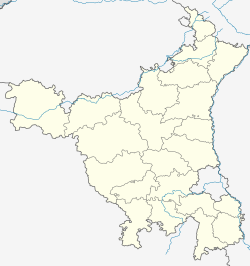Mangar Bani | |
|---|---|
Village | |
| Coordinates: 28°22′43″N 77°10′23″E / 28.3787474°N 77.1731615°E | |
| Country | India |
| State | Haryana |
| District | Faridabad |
| Time zone | UTC+5.30 (IST) |
Mangar Bani, a paleolithic archaeological site and sacred grove hill forest next to the Mangar village on Delhi-Haryana border; is in the South Delhi Ridge of Aravalli mountain range in Faridabad tehsil of Faridabad district in the Indian state of Haryana.[1][2][3][4] It lies, immediate south of India's national capital Delhi, within NCR.
It is Indian subcontinent's largest neolithic South Asian Stone Age site and tool making factory dating back to 100,000 years Before Present (BP), first ever such site with cave painting in Aravalli range dating back to 20,000-40,000 BP, making it the oldest human habitation discovered in Haryana and Delhi NCR.[5]
Contiguous to Asola Bhatti Wildlife Sanctuary, it is an important biodiversity area within the Northern Aravalli leopard wildlife corridor stretching from Sariska Tiger Reserve to Delhi with several wetlands, formed in the abandoned open pit mines in and around the area and have significance for the migratory birds, are Badkhal Lake, 10th century ancient Surajkund reservoir and Anangpur Dam, Damdama Lake, Tughlaqabad Fort and Adilabad ruins (both in Delhi).[6]
There are concerns for its destruction due to littering, encroachment and illegal construction in the nearby area. Activists have been demanding that government must implement a wide-ranging conservation plan, legally declare this area as the protected forest and protected archaeological site, and have it listed among the UNESCO World Heritage Sites of India.[5]
- ^ Navneet Mendiratta (30 July 2017). "Here's why Mangar Bani can be your ideal weekend getaway". India Today. India: India Today. Retrieved 16 January 2019.
- ^ "Saving Mangar Bani: Why returning grove to original custodians may be only solution - Times of India". The Times of India. India. Retrieved 16 January 2019.
- ^ "Haryana's Mangar Bani forest demarcated at last". hindustantimes.com/. India: Hindustan Times. 3 September 2015. Retrieved 16 January 2019.
- ^ Mangar, Census of India 2011.
- ^ a b Cite error: The named reference
mangr1was invoked but never defined (see the help page). - ^ ASOLA BHATTI WILD LIFE SANCTUARY Archived 16 August 2011 at the Wayback Machine, Department of Forest, Delhi Government

